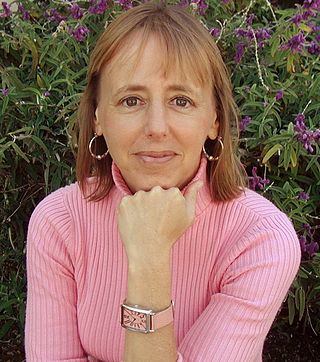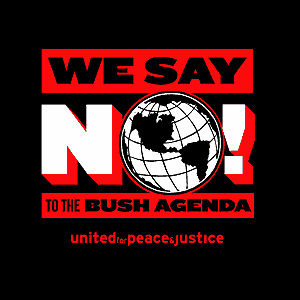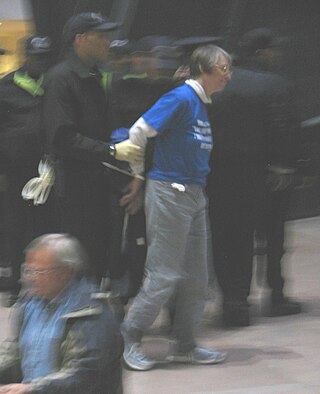Related Research Articles

Beginning in late 2002 and continuing after the 2003 invasion of Iraq, large-scale protests against the Iraq War were held in many cities worldwide, often coordinated to occur simultaneously around the world. After the biggest series of demonstrations, on February 15, 2003, New York Times writer Patrick Tyler claimed that they showed that there were two superpowers on the planet: the United States and worldwide public opinion.
The European Social Forum (ESF) was a recurring conference held by members of the alter-globalization movement. In the first few years after it started in 2002 the conference was held every year, but later it became biannual due to difficulties with finding host countries. The conference was last held in 2010. It aims to allow social movements, trade unions, NGOs, refugees, peace and anti-imperial groups, anti-racist movements, environmental movements, networks of the excluded and community campaigns from Europe and the world to come together and discuss themes linked to major European and global issues, in order to coordinate campaigns, share ideas and refine organizing strategies. It emerged from the World Social Forum and follows its Charter of Principles.

Medea Benjamin is an American political activist who, along with Jodie Evans and others, co-founded Code Pink. She also co-founded, along with her husband Kevin Danaher, the fair trade advocacy group Global Exchange. Benjamin was the Green Party nominee in the 2000 United States Senate election in California, running under the name Medea Susan Benjamin.

United for Peace and Justice (UFPJ) is a coalition of more than 1,300 international and U.S.-based organizations opposed to "our government's policy of permanent warfare and empire-building."
Chicago Coalition Against War & Racism (CCAWR) was formed in September 2001 to protest the imminent United States invasion of Afghanistan. As of 2018, they had changed their name to Chicago Committee Against War and Racism. CCAWR gained a foothold in Chicago street politics and rose to prominence when it organized a rally at Federal Plaza the day after the U.S. invaded Iraq on March 20, 2003.

Dissent! was the name adopted by an international network of local groups, which came together to organise opposition to the G8 summit held at Gleneagles Hotel, Perthshire, Scotland, in July 2005. Most groups shared an anti-capitalist orientation and anti-authoritarian organizing methods and the network declares itself to be open to anyone prepared to work within the Hallmarks of Peoples' Global Action, an international co-ordination of radical social movements and grassroots campaigns. Dissent acted as a networking tool and created infrastructure which was used by groups with methods of protest ranging from anti-border city tours and street parties to road blockades, graffiti and confrontations with the police.

The Serious Organized Crime and Police Act 2005 is an Act of the Parliament of the United Kingdom aimed primarily at creating the Serious Organised Crime Agency. It also significantly extended and simplified the powers of arrest of a constable and introduced restrictions on protests in the vicinity of the Palace of Westminster. It was introduced into the House of Commons on 24 November 2004 and was passed by Parliament and given royal assent on 7 April 2005.

On 15 February 2003, a coordinated day of protests was held across the world in which people in more than 600 cities expressed opposition to the imminent Iraq War. It was part of a series of protests and political events that had begun in 2002 and continued as the invasion, war, and occupation took place. The day was described by social movement researchers as "the largest protest event in human history".

On September 24, 2005, many protests against the 2003 invasion of Iraq and the Iraq War took place.

The proposed invasion of Afghanistan prompted protests with mass demonstrations in the days leading up to the official launch of the war on October 7, 2001. The continuation of the war in Afghanistan from 2001 to 2021 lead to further protest and opposition to hostilities.
On 20 March 2003, the day after the invasion of Iraq had begun, thousands of protests and demonstrations were held around the world in opposition to it. In many cases, these protests were known as "Day X" protests, reflecting the fact that they had been organized to occur when war started, whatever day that might have been. At least 350,000 people participated. The previous protests in February had been substantially larger.

Simon Oosterman is a New Zealand political activist, trade unionist, and syndicalist. He is best known for coordinating the Unite Union campaign 'Supersizemypay.com', which targeted the fast food industry and advocated for the abolition of youth rates and for a $12 minimum wage, and the world's first Starbucks strike, and for his involvement in the World Naked Bike Ride, on which he was arrested for indecent exposure.
Milan Rai is a British writer and anti-war activist from Hastings. He is co-editor with anti-war artist Emily Johns of the magazine Peace News.
Pittsburgh Organizing Group, often referred to as POG, was a Pittsburgh, Pennsylvania-based anarchist organization concerned with anti-militarism, social and economic justice, labor solidarity and police brutality issues locally, nationally, and internationally. POG was formed in 2002, and since then it has been responsible for the most persistent local protests against the Iraq War and claims to be one of the largest radical groups in Pittsburgh. The group has organized protests, pickets, vigils, direct actions, street theatre, concerts, teach-ins, conferences, and rallies. Some of its events have been overtly confrontational and disruptive. More than 122 people have been arrested at POG organized direct actions, and some events have involved direct confrontation with the police. POG is an affiliate group of the Northeast Anarchist Network.

March 19, 2008, being the fifth anniversary of the United States 2003 invasion of Iraq and in protest and demonstration in opposition to the war in Iraq, anti-war protests were held throughout the world including a series of autonomous actions in the United States' capitol, Washington, D.C., in London, Sydney, Australia, and the Scottish city of Glasgow with the latter three being organized by the UK-based Stop the War Coalition. Actions included demonstrations at government buildings and landmarks, protests at military installations and student-led street blockades. The protests were notable, in part, for mostly replacing mass marches with civil disobedience – including religious-focused protests – and for utilizing new technologies to both coordinate actions and interface with traditional print and broadcast media.

Stop the War Coalition (StWC) is an Australian anti-war group initially formed in Sydney in 2003 in response to the US-led wars in Iraq and Afghanistan and the general "War on Terror" of which the Australian Government has been a strong ally.

Occupy Movement protests took place in New Zealand, beginning on 15 October 2011 with the Occupation of Auckland. Occupy protests took place in Auckland, New Plymouth, Wellington, Lower Hutt, Christchurch, Dunedin, and Invercargill.
There were several COVID-19 protests in New Zealand held during the period of COVID-19 restrictions from 2020 to 2022, where people protested the government's response to the COVID-19 pandemic in New Zealand, in particular the lockdown measures in place in March–May 2020, August 2020, and August–November 2021 and the later vaccine mandates. The protests have been largely condemned by members of parliament, as well as local city and regional councils. Fears were also raised about the protests increasing the spread of the virus.

The 2022 Wellington protest was an anti-mandate and anti-lockdown occupation of the grounds of Parliament House and Molesworth Street in Central Wellington during the peak of the COVID-19 pandemic. The occupation spring boarded off the New Zealand Convoy 2022, a mass convoy of vehicles that made its way from the top of the North Island and the bottom of the South Island to Parliament starting on Waitangi Day and arriving three days later on 9 February. The occupation lasted just over three weeks. At its peak, the protest spread over a large area of Thorndon and into Pipitea with approximately 1,000 participants. Protesters blockaded areas around the parliamentary grounds with their vehicles and occupied the lawn and surrounding areas in tents. Some associated with the protests harassed bystanders, and disrupted local businesses. The protest was forcibly ended by police on 2 March 2022, and the protesters had none of their demands met by the Government.

The Freedoms & Rights Coalition (TFRC) is a self-described "people's movement" founded by Destiny Church founder and leader Bishop Brian Tamaki in 2021 to oppose the New Zealand Government's COVID-19 lockdown restrictions and vaccine mandates. The group organised protests in Auckland and across New Zealand. In mid-July 2022, the Coalition launched a second wave of protests against the Labour Government, whom they accused of incompetence and contributing to the country's socio-economic problems and shortages.
References
- ↑ Global Peace and Justice Auckland website
- ↑ New Zealand Herald, February 16, 2003
- ↑ Herald on Sunday March 20, 2005
- ↑ "Aotearoa IMC: M19 - US/ANZ out of Iraq - Police brutality". Archived from the original on 27 September 2007. Retrieved 3 October 2006.
- ↑ Scoop: Anti-U.S. Occupation Protest Faces Off With Police